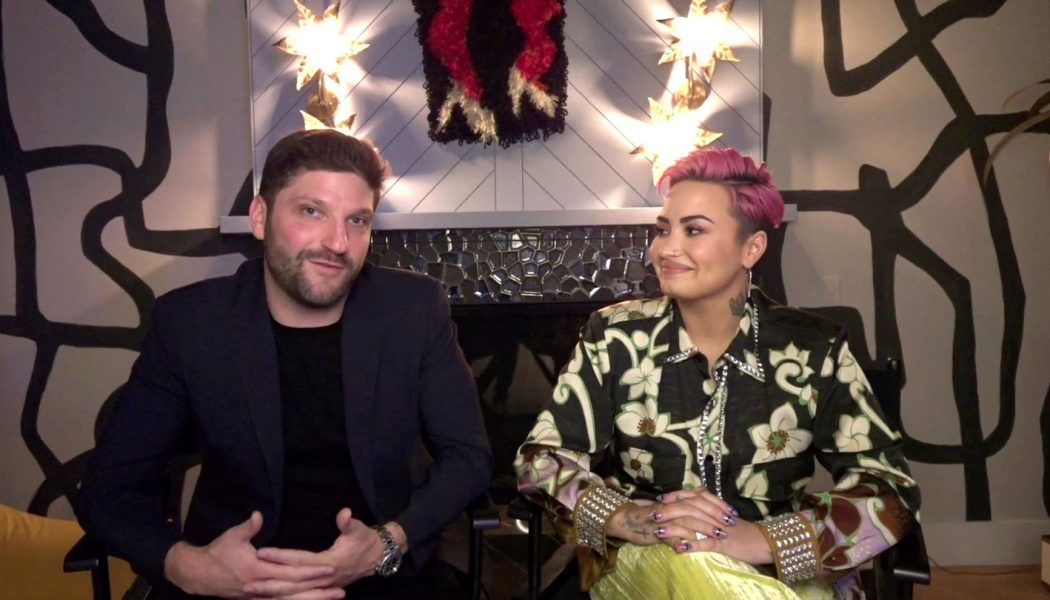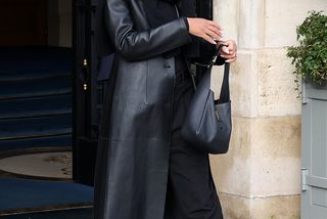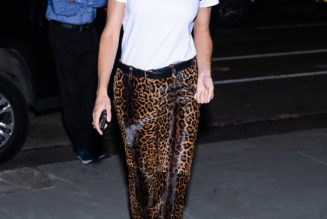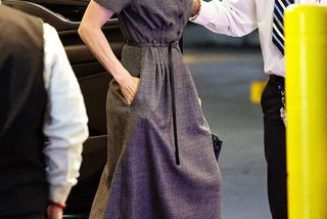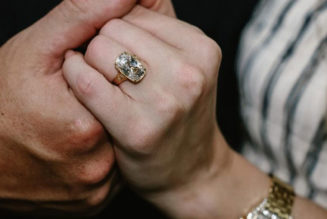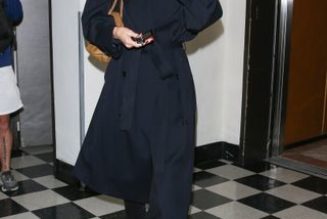
By Rob LeDonne
Trigger warning: This interview discusses sexual assault and drug addiction.
When Demi Lovato approached director Michael D. Ratner about a docuseries on her life, the singer was clear: The goal was to be as honest as possible. The result is Demi Lovato: Dancing with the Devil, a warts-and-all four-part look at the tumultuous, complicated personal life of the actress and pop superstar. Going beyond the clickbait headlines and preconceived notions about Lovato’s troubles, Dancing with the Devil paints an honest, human portrait of the heart-wrenching reality of addiction and covers in excruciating detail the death of her father, her near-fatal 2018 overdose, and instances of sexual assault and rape. It’s an unflinching look at family and friendship, love and heartbreak, setbacks and perseverance.
From the Glendale, California, set of the eponymous “Dancing with the Devil” music video (timed to drop in tandem with the docuseries), Ratner spoke to MTV News over the phone about how he tackled the delicate subject matter, the project’s stunning revelations, and the importance of portraying Demi’s truth, including the fact she’s no longer completely sober. “We’re not tying anything up in a neat bow, whether looking back or forward,” Ratner says. “We talk about the complexity of humanity in people and human beings, whether you’re a musician or you and me. This is really a human documentary told in the world of music.”
MTV News: You’re the mastermind behind a range of celebrity docuseries, whether lighthearted (Kevin Hart’s Cold as Balls) or deep (Justin Bieber: Seasons). How did you and Demi Lovato begin your collaboration?
Ratner: I previously directed her in a show called Pretty Big Deal that Ashley Graham hosts. Demi talked a bit about her story in that, and I was like, man, there’s a lot more there. There’s a deep, rich opportunity for her to elaborate. Then I directed the Justin Bieber docuseries Seasons, where he got candid about his own life. She saw that, and we sat down to talk about how she wanted to tell her own story. She had done a documentary before [2017’s Simply Complicated] and was actually working on a follow-up to that in 2018 during the Tell Me You Love Me tour, but production stopped when she overdosed. I think the other documentaries were her trying to tell her truth, but she didn’t go all the way there. We agreed to do the project once I realized she wasn’t focused on just making a commercial. She was finally ready on her own terms to tell the real story, and I was thrilled.
MTV News: Dancing with the Devil opens discussing Demi’s late father, who struggled with both mental illness and addiction. Was that always the plan, or did the progression of the story present itself as you were working on it?
Ratner: My plans are always loose, but I follow a story. I had a game plan going into it that came from countless off-camera conversations, because if you go in and have no idea what you’re doing, you’re in for a mess. But [the story of Demi’s father] was one of those key things and it really made sense to begin there.
There are people who jump to conclusions about Demi or didn’t know about that aspect of her. I think it was a huge piece and one of many factors that led her down the path that she went. One thing for certain is that we’re making no conclusions when it comes to summing it up. We left no detail spared when talking about her father and the profound impact it had on her, even some of the adjectives she uses describing death, the memories of that, and the feelings it evokes. It all really set the stage.
MTV News: This series is truly raw, whether recounting her sexual assault or going through the moment she overdosed in extreme detail, how she had three strokes and a heart attack. What’s it like for you as a filmmaker and a person to talk to Demi and the people closest to her, including her family and friends, about some of the darkest moments of their lives?
Ratner: One of the hardest conversations was talking to her mother and stepfather about nearly losing their daughter. That’s not the type of conversation you can have and then go about your day and meet up with some friends for dinner. It sticks with you and weighs on you. I’ve been living in this world and you learn the details and understand them so deeply, and I think that is what helps shape a narrative. You need to become the ultimate listeners so that when people are sharing the darkest moments of their lives, they’re in that safe space.
You do have these moments where it feels like you need to respect the boundaries of making sure somebody is OK. At the same time, when you know their north star goal of what they’re trying to accomplish with the project is truth, there are some uncomfortable conversations you need to have in an effort to see through their vision. So, it’s an honor that they invite me to learn, listen, and share.
MTV News: There was still a lot going on in Demi’s life while you were making the documentary. I’m thinking specifically about her short-lived engagement. You were doing interviews that were totally obsolete by the time you finished. What’s it like for you as a filmmaker when the subject you’re documenting is constantly changing?
Ratner: When I was making this, I got a call that she had a boyfriend, I got a call that she had a fiancé, and then I got a call that they called off the engagement. As is life, right? So there’s that first moment of, “Oh, wow,” when you have to pivot or rethink things. The other moment is that you realize this is real, things change, and you cannot control everything. It’s actually very to the point.
We’re also making a documentary about a 27-, 28-year-old, which are prime growth years. The second you stop rolling, more growth is going to happen. I always joke with Demi: If you sign up to direct a Demi Lovato project, you better keep the camera rolling. I think one of the hardest things to do when making a documentary about someone in their prime is figuring out where it ends. There’s actually no real ending.
MTV News: The series serves as an education for people who don’t know what it’s like to have someone they love experience addiction. For example, you talk with Demi about how “People can understand picking up a joint, but what people don’t understand is picking up the harder drugs.” Everything is also presented in a very clinical way, even when you spoke to a neurologist. Why did you decide to present the story like this?
Ratner: I think the goal here is to provoke dialogue and remove the stigma of talking about these subject matters. It was also extremely important to understand the power and reach this docuseries can have. She has 100 million followers on Instagram alone, so a lot of people are going to see this. Addiction is a dangerous disease, and it’s vital that we show you that no two journeys are alike. While we are not preaching that there’s any one-size-fits-all solution, what we wanted to do is get people talking and state loud and clear that it’s OK not to be OK and you should seek help if you can. We provide some resources at the end of every episode for you to do that. The worst thing you can do is keep it in your head and feel that isolation, feel like you can’t speak about it or think that nobody else goes through it.
MTV News: One moment I was particularly surprised by was when it’s revealed Demi is no longer sober. Can you talk to me about that revelation?
Ratner: Demi isn’t the poster child for anything, and we weren’t trying to say she is. It was vital that we tell people that your route isn’t like Demi’s and the way to get help is to speak to people. It was quite important that we have all voices in this piece, and I think one of the most powerful moments is when we have Elton John completely, matter-of-factly, candidly, and concisely disagreeing with Demi’s stated point of view. He says, “Moderation does not work, sorry.”
This is a wildly complicated issue. We are not telling anybody how to live their lives, and it’s important that, given a history of being put on a pedestal for so many years, that there’s no aha moment for Demi. She can let herself and other people down. She’s loudly and clearly saying she understands her struggles and is working on them daily. She’s doing everything she can in her power to be her best self.
MTV News: Were you hesitant to keep that in? You do have Elton counteracting it, but was there ever a thought that maybe it would send the wrong message or put her on blast?
Ratner: I think that it was more how we include it versus do we include it. We needed to be very clear that this was not telling anybody else to follow suit. Ultimately, Demi’s vision for this is that she wanted to have people know the real her at the end of it. I think we would have been setting her up for failure if that was omitted. If we left the impression she was totally sober, it wouldn’t have been the truth. There’s no universal solution, and Demi is new to exploring this and she’s taking it day by day and working on herself constantly so she doesn’t end up back in the same place she was. She’s also saying that this is what’s working for her today.
MTV News: Another thing I think that admission represents, especially after how heart-wrenching everything came before it was, that as a viewer you think, “She’s done drinking and doing drugs forever.” But the nature of addiction is that things are never so clear.
Ratner: In the documentary there’s a line by [Lovato’s recovery case manager] Charles Cook, and he says, “How could you do this, how could you do this again?!” He talks about the hurt. If you’re watching this and you don’t know much about addiction you’d certainly think, “OK, there’s no way she’d use again.” But it’s a disease and a difficult one. It’s very important to talk about the lack of a perfect path, and towards recovery in this specific instance.
MTV News: Demi is so candid in the documentary, but I’m wondering if there’s anything at all you left on the cutting room floor that maybe went too far or revealed too much?
Ratner: There was not, which is pretty fascinating and almost unbelievable. Some of the stuff that made her feel uncomfortable or even gave her a physical reaction when we were watching it together, she left in. She thought that ultimately it was important for a full catharsis. I had a pretty good understanding of what she wanted to tell. When we were filming, she never once said, “Oh, I don’t want that in it.”
